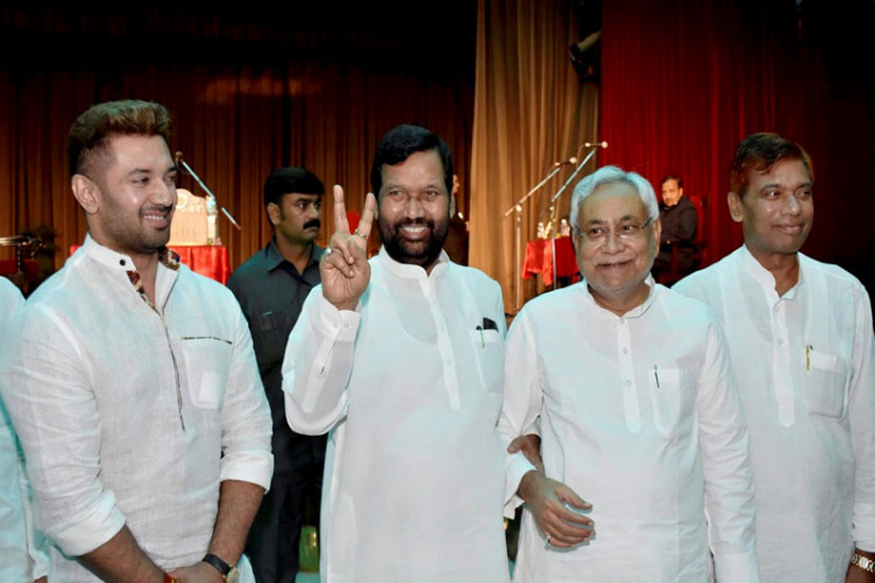Source – news18.com
Patna/Ranchi: All the allies of the Bharatiya Janata Party (BJP) seem to have cocked a snook at it in Jharkhand before the crucial state assembly elections, as they are crossing the swords against each other leaving the electoral battle free for all and posing a doubt on its electoral prospects and return to power once again.
The NDA stands fractured in Jharkhand as the All Jharkhand Students Union (AJSU) party, the only official ally of the BJP in the state, is singing a different tune, while the Janata Dal (United) and Lok Janshakti Party (LJP), which are allies of the BJP at the national level and Bihar, are fighting the ensuing polls independently.
Though the BJP and AJSU party have not officially parted ways, the two are locked in electoral battle in 27 out of 81 assembly seats in Jharkhand as both the allies have not achieved seat-sharing agreement despite several rounds of talks held at different levels. Both allies have been part of the NDA coalition governments in Jharkhand since it was carved out of Bihar in 2000.
The BJP has not fielded any candidate against AJSU chief Sudesh Mahato from Silli assembly seat. The AJSU has returned the favour by staying away from Jamshedpur East assembly seat, where Jharkhand chief minister Raghuvar Das is the BJP nominee.
In 2014 assembly polls, the AJSU had won eight seats including Silli, Lohardaga, Tamar, Ramgarh, Chandankiyari, Tundi, Barkagaon and Jugsalai. The BJP this time was not willing to cede more than 12 seats to the AJSU.
The JD(U) has chastened the BJP by throwing its weight behind former Jharkhand minister Saryu Rai in the Jamshedpur East assembly seat. Rai, a longtime BJP leader, is contesting as an independent candidate against chief minister Raghuvar Das.
When his name did not figure in the BJP list of candidates, he announced to contest against the Jharkhand chief minister as an independent candidate. Rai has attributed his denial of ticket to his friendship with Bihar chief minister Nitish Kumar, who had released his book in 2017.
The JD(U) has already announced withdrawal of party’s official candidate from Jamshedpur East seat, Sanjay Thakur, and Jamshedpur West seat, Sanjiv Acharya, from the fray. However, Bihar chief minister and JD(U) president Nitish Kumar has refused to campaign in favour of Saryu Rai.
Rai has been raising the issue of corruption in Jharkhand despite being part of the Raghuvar Das government. A senior politician from united Bihar including the present Jharkhand, Rai has been instrumental in exposing the fodder scam against the then Bihar chief minister Lalu Prasad.
It is learnt that besides the JD(U), the AJSU has also extended tacit support to Rai while the Jharkhand Mukti Morcha (JMM) has pledged him support in the election.
The BJP and the JD(U) are bound to wage a political battle against each other in Jharkhand. The JD(U) has so far announced 25 candidates of the total 81 seats. Jharkhand JD(U) president Salkhan Murmu, who is contesting from Majhgaon (ST) seat, said that the party was looking forward to contesting as many seats as possible, depending on availability of winnable candidates.
It is a known stand of the JD(U) that it would have alliance with the BJP only at the national level and in Bihar, while in other states it would contest the elections all alone. The ostensible purpose behind such stand is to increase its vote share and thereby achieve the status of a national party.
The JD(U) has been contesting the Jharkhand assembly polls even before the state was carved out of Bihar in November 2000. In 1995 assembly polls, when Bihar and Jharkhand were united, its parent outfit — the erstwhile Samata Party — could not win any seat from the South Bihar region, which later became Jharkhand. In 2000 elections, it won five seats from this region.
The Samata Party later merged with the splinter group of the Janata Dal-led by Sharad Yadav to become JD(U). In the 2005 assembly polls in Jhakhand, the JD(U) had won six seats out of 18 seats it contested. The number came down to 2 in the 2009 assembly elections when the party contested 14 seats and to naught in the 2014 assembly polls when party contested 11 seats.
Bihar chief minister Nitish Kumar is trying to make a ‘considered’ foray into Jharkhand with a carefully laid game plan as the opposition parties, including the Congress and the Jharkhand Mukti Morcha (JMM), are in complete disarray.
Senior leaders believe that party’s alliance with the BJP in Jharkhand has caused substantial damage to it as its members largely felt hemmed in by big brother BJP. In the past, its tall leaders like Inder Singh Namdhari and Radha Krishna Kishore had quit as they could not find space in the state politics. Party’s past experiment with leaders like Lalchand Mahato and Jaleshwar Mahato has also not yielded the desired political gains.
The JD(U) has decided to increase its footprints in smaller states by increasing the number of MLAs and percentage of votes to attain the status of national party by 2020. It will also fight the elections in Delhi and Jammu and Kashmir. It is now recognised party in Bihar and Arunachal Pradesh.
LJP chief Chirag Paswan has also announced to contest 50 seats in the Jharkhand assembly elections. Though the LJP was keen on an alliance with the BJP in Jharkhand too, the saffron party was reluctant as its leaders believed that the LJP has not much to offer electorally in Jharkhand.
The conflict among the BJP, JD(U) and LJP in Jharkhand will certainly have its repercussions in the Bihar assembly elections due in 2020. The acrimony is bound to inflict bruises to the allies.
The Jharkhand elections will be held in five phases between November 30 and December 20 and the results will be declared on December 23.
